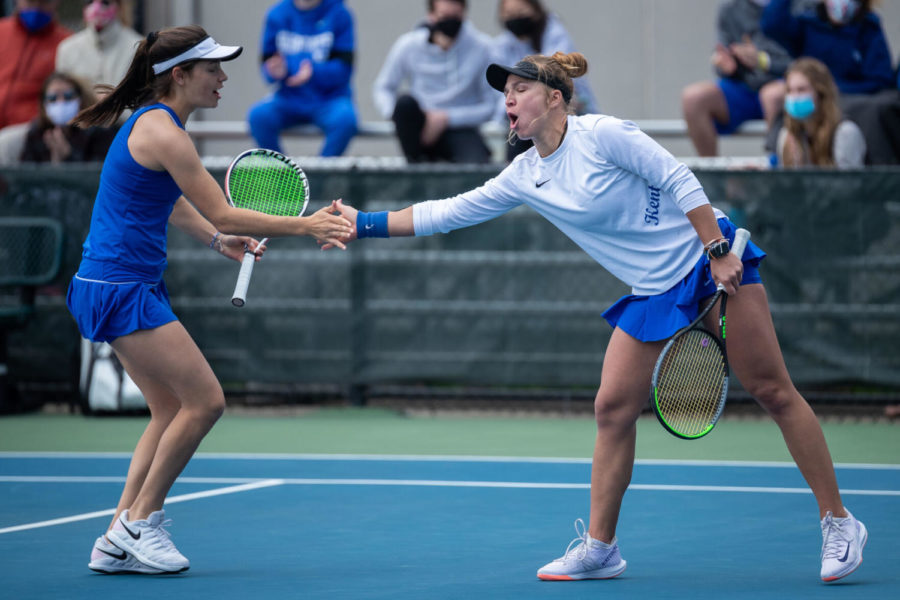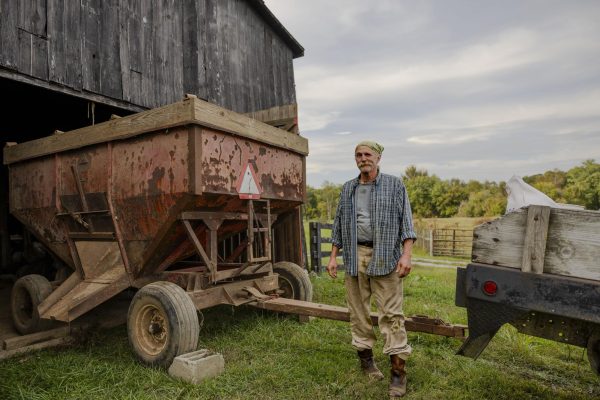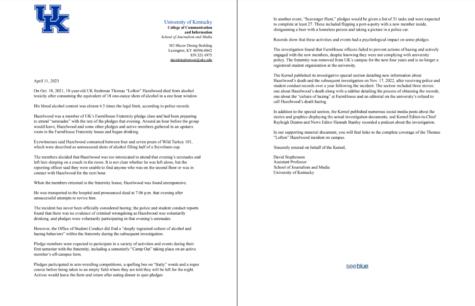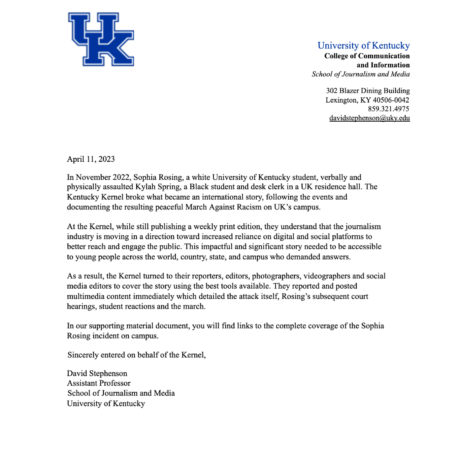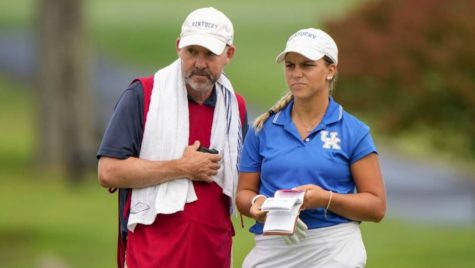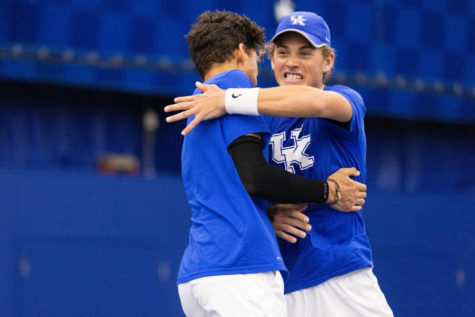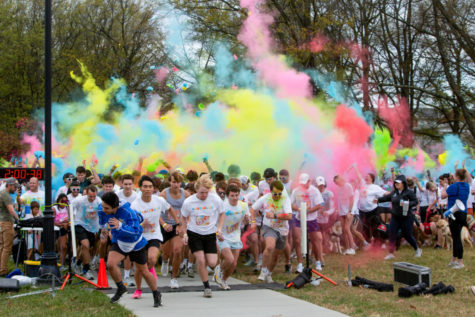‘The exciting part’: UK doubles tandem no. 1 seed in NCAA tournament
May 23, 2021
UK doubles tandem Fiona Arrese and Akvile Paražinskaite will take the court in Orlando on Monday, May 24 in search of a national title. Seeded no. 1 in the NCAA tournament after a dominant season, the pair are a mix of veteran experience and fresh insight that gives them a viable chance at the championship.
Arrese and Paražinskaite are the first UK doubles pair under head coach Carlos Drada to be ranked no. 1 both for the tournament and the regular season. The farthest a UK tandem has gone in the tournament is national runner-up, which Amy Trefethen and Sarah Witten claimed in 2003.
Arrese and Paražinskaite played together throughout the 2020 – 2021 season, boasting an overall record of 20-4, going 17-4 in dual competition, 11-1 in SEC play and 6-3 against nationally ranked opponents.
The duo was first paired up by coaches after watching them mesh in practice. According to Paražinskaite, they instinctively read each other well enough that coordinating on the court wasn’t a big leap.
“Before I say what I want us to do, she already knows what we want to do. So just that dynamic where just saying this thing, understanding each other and just understanding doubles overall – doubles is such a tactical part of tennis,” Paražinskaite said.
That dynamic is key in doubles because of the need for communication in calling plays, claiming shots or reading the opponent. Arrese and Paražinskaite communicate most often – and sometimes in Spanish – as a check-in ritual.
“Between the first and second serve, if the opponent is serving, we always like exchange a couple of encouragement words,” Paražinskaite said.
Serve and return is one of the most crucial aspects of tennis because it can set the tone for a point or a whole game. Changes in momentum are often caused by one player “breaking” the other’s serve – winning a game over the server.
Both Arrese and Paražinskaite said they worked during the season to improve the consistency of their serves. As far as strategy goes, Arrese promptly and succinctly summed up their doubles approach in one word – “aggressive.”
“Poaching, getting the volley, we’re not waiting for our opponents to miss. We go for it, we swing on our serves, we come to net – that’s how we played doubles, and that’s why it’s working,” Paražinskaite said.
Their strategy led to the pair being named first team all-SEC and a top spot in the tournament. But their competitive spirit is tempered by a love of the game and fun behind the scenes.
Paražinskaite described Arrese as always dancing, always on the move, joyful and loud – in a good way. Arrese said Paražinskaite was “funny and generous.”
Both said their partner was competitive, which helps spur the other on. As a graduate student, Paražinskaite has more collegiate experience than Fiona, a freshman, allowing her to take on a mentor role.
“I’m just so much older. It’s just more like they’re a teacher. But she listens really well,” Paražinskaite said. But the partnership goes both ways; Arrese’s drive and enthusiasm as a freshman has given more meaning to Paražinskaite’s search for a title on what she called her last stretch.
“For Fiona, it’s her first year, it’s just the beginning. Many to come for her but yeah, for me it’s just finishing off strong,” Paražinskaite said.
Paražinskaite, ranked no. 28 and with a 17-7 record in singles, also qualified for the singles tournament but lost in the first round against UNC’s Alexa Graham.
Graham, a senior out of New York, has 130 career singles wins, was 12-2 on the season and ranked no. 41 in singles nationally.
Graham and the Tar Heels played most recently on May 21, losing to Pepperdine in the semifinals of the NCAA women’s team championship. UNC was ranked no. 1 heading into the tournament on a 48-match win streak, and though the team lost, Graham emerged from the semifinal with a win over no. 21 Jessica Failla.
Paražinskaite lost to Graham in straight sets in what was her first career appearance in the singles tournament. Collegiate players play both singles and doubles during the season, and the loss left Paražinskaite with a 20-12 record in singles this year.
Doubles is more about strategy, while singles can often be about mental endurance for what some call the loneliest sport. Arrese likes doubles better because there is someone on the court with you to rely on and share the highs and lows.
“It’s more fun. I have more fun with another person. If we miss, we miss together,” Arrese said. Paražinskaiteis the first and only doubles partner Arrese has had in her college career because this is her first season.
“I came here and I really like to play with Akvile before like she knows a lot, she has taught me a lot. And I love to play with her, she knows every time what to do,” Arrese said.
Paražinskaite enjoys both singles and doubles equally, but feels they are not comparable.
“Doubles is definitely just more tactical overall, it’s more planning ahead and like she said, you have someone next to you, so it’s really, really fun,” Paražinskaite said. Part of that partnership is dependability and a judgment free-zone – knowing your partner won’t blame you if you miss a shot in your domain.
The pair have had to execute in unpredictable conditions, like a windy match against Tennessee that Paražinskaite said was their biggest challenge in the regular season. That kind of adaptability will be needed in the NCAA tournament, where the best of the best will face off at the USTA National Campus in Orlando, Florida.
Arrese and Paražinskaite were automatic qualifiers for the NCAA tournament, which features a field of 32 pairs. They will face the at-large selection of Brooke Killingsworth and Anna Brylin of Wake Forest in the first round, with the match time still undetermined.
Killingsworth and Brylin were paired together almost all season, barring two matches in late March where Brylin did not play. The tandem were ranked no. 24 at the time of their last match, a 2-6 loss to Georgia on May 8. Killingsworth and Brylin put up a 13-7 record this season and had two unfinished matches.
Like Arrese, Killingsworth is a freshman, coming to Wake Forest out of Arkansas where she was a state champion. Brylin is a junior out of New Jersey.
Though Wake Forest plays in the ACC and Kentucky in the SEC, the two teams shared four common opponents this year: Tennessee, Syracuse, Georgia and Notre Dame.
UK went 3-1 against those schools, dropping only to Georgia, while Wake Forest was only 1-4, claiming a team victory only over Syracuse.
Of those four matches, Arrese/Paražinskaite and Killingsworth/Brylin faced the same doubles opponents only once. Both pairs played against Natalie Novotna and Viktoriya Kanapatskaya of Syracuse, who were Syracuse’s second in doubles against Wake Forest but first against UK.
Arrese/Paražinskaite lost to Novtona/Kanapatskaya 3-6, while the match between Killingsworth/Brylin and Novotna/Kanapatskaya was unfinished with the pairs tied 6-6.
For Paražinskaite, who earned her Master’s in diplomacy and international commerce this year, the tournament matches will be the last of her collegiate career as she weighs joining the pro circuit.
“My whole experience here, just thinking about a kid that came in freshman year and who I’m graduating right now as a person, it’s just completely two different people and I’m really excited about that,” Paražinskaite said.
Paražinskaite is from Vilnius, Lithuania and started playing tennis around six or seven years old. She considered going pro first before coming to Kentucky.
“I’m really grateful because I had so many cool experiences,” Paražinskaite said. “For me it was just kind of picked up the tennis racquet and never put it down.”
Arrese, a mechanical engineering major, started playing tennis at seven and played for clubs through her teens. Like many of her friends from Spain, she chose to play tennis in college to continue her studies. She chose Kentucky for the environment and relationships between the players.
“We’re just one big family a bunch of sisters. And then the younger girls, they knew each other from before so they’re even closer to each other, which is awesome,” Paražinskaite said.
The team atmosphere has helped the pair avoid overthinking in the run-up to the national tournaments, focusing on encouraging each other.
“Having fun, like fighting all together,” Arrese summarized. That mindset shone through in Kentucky’s first round match of the team tournament, where Arrese won the final singles point to clinch Kentucky’s victory over Syracuse.
Arrese dropped the second set of the match but forced mishits from opponent Polina Kozyreva to push Kentucky up 4-3 and send the team to the second round, their ninth trip to regionals under Drada.
Kentucky lost in the regional round against no. 16 Cal on May 8, the last time Paražinskaite and Arrese played doubles in competition. Paražinskaite won her singles against Cal, but she and Arresse lost 7-6 to Haley Giavara and Valentina Ivanov in doubles despite pushing back from a 3-game deficit to force a tiebreak.
The team competition marked Arrese’s first career appearance in an NCAA tournament. Monday will be her first appearance in the doubles tournament, which is not team-based.
Paražinskaite previously competed in the 2019 NCAA doubles tournament with Justina Mikulskyte, but the pair lost in the first round to the no. 15 tandem from Gonzaga.
The NCAA doubles tournament is best-of-three sets with no-ad scoring and a 7-point tiebreaker at six-games-all. In lieu of a third set, a 10-point match tiebreaker is played.
Paražinskaite said the length of tennis matches sometimes takes viewers by surprise, but the players stay ready for anything.
“Shoulders back, on top of our toes, just constantly bringing that energy,” Paražinskaite said. Now down to the wire, Paražinskaite said the doubles tournament is a chance to polish off the work they’ve been putting in and claim the reward.
“We’ve been training for the whole year,” Paražinskaite said. “This is the exciting part. When nationals comes, this is where it all comes down to.”












































































































































